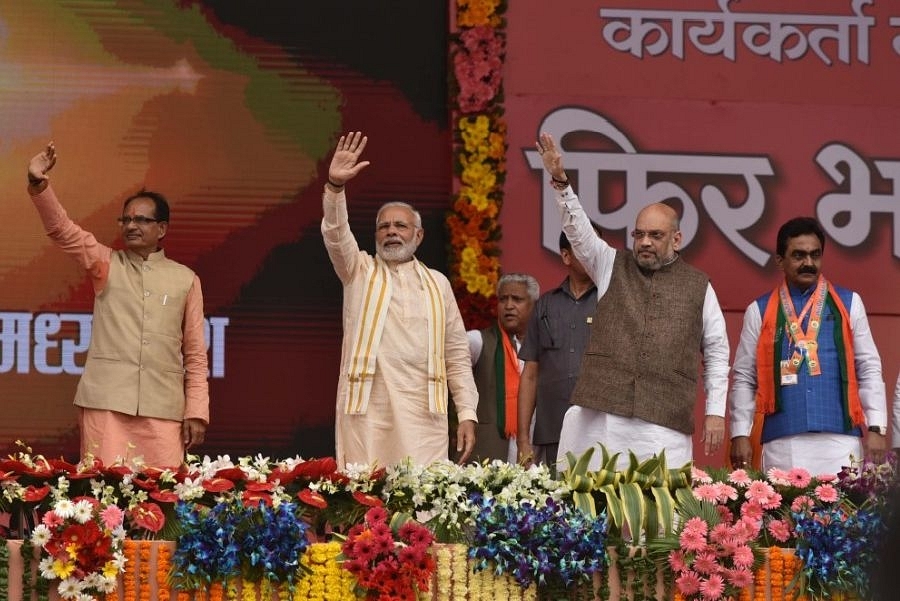Blogs
The BJP Has A Problem Winning The States It Has Ruled; Modi’s Appeal Alone Doesn’t Seem Sufficient
- As popular anecdotes testify, people are voting for Narendra Modi first and BJP second. This has immensely benefited the BJP when it comes to national elections.
- The contrary is true when it comes to state elections where the path is laden with forgettable results.

Prime Minister Narendra Modi with BJP President Amit Shah and Madhya Pradesh ex-chief minister Shivraj Singh Chouhan in Bhopal (Mujeeb Faruqui/Hindustan Times via Getty Images)
What ails the Bharatiya Janata Party (BJP)? This may sound like a preposterous question when just six months back the party won a massive mandate in the Lok Sabha elections. It swept the Hindi heartland states and gained traction in states like West Bengal where it is eyeing new territory.
Since the advent of Narendra Modi on the national scene in September 2013 — when he was nominated as the prime ministerial candidate — the BJP has never been the same.
From winning the 2014 Lok Sabha with an absolute majority, it’s a juggernaut that seems impossible to stop. However, there is a significant dichotomy that has played out in the last five years.
Narendra Modi's rise has coincided with the undermining of the BJP has a party brand. Few will disagree; the Prime Minister's popularity far outweighs the party’s popularity.
As popular anecdotes testify, people are voting for Narendra Modi first and BJP second. Personality politics has been taken to a new level. This has immensely benefited the BJP when it comes to national elections, in which it got an unprecedented full majority mandate for the second time.
The contrary is true when it comes to state elections where the path is laden with forgettable results. From the time the party came to power at the centre it has been very difficult for it to retain states, whereas it does well when riding on anti-incumbency.
It lost Madhya Pradesh (MP), Rajasthan, Chhattisgarh, Punjab, and Karnataka is always on the edge. Haryana was saved in the last-minute with a post-poll tie-up, Gujarat was won by the skin of its teeth after last-minute fervent appeals, and in Maharashtra, the drama is still unfolding.
Delhi was a big surprise coming just after 2014. The gains in states like Uttar Pradesh, Tripura and Assam have been attributed to various reasons but the commonality is it was riding on anti-incumbency. The BJP is adept at securing states where it did not rule. Whether West Bengal tells another story is a matter of time.
The dichotomy is stark. Why is the BJP not able to translate the popularity of the Prime Minister and consequently the gains for the party into winning state elections? Therein lies the flaws of the politics of personality.
The electorate, when it goes into voting for general elections, has the big macro picture in mind — be it Defense, Internal Security, Foreign policy, or Welfare measures amongst others — all of which transcend the impact of unpredictable economic policy decisions. Decisive actions on various fronts have reinforced the image of a strong leader.
State elections have to be different from national elections; this has been proved by their unilinear outcomes. BJP as a party is finding it difficult to move beyond the aura of the PM.
What lies beneath? It’s a combination of a multitude of things, the primary one being that the issues at the state level are very different from those at the national level. The caste combinations and their aspirations become pronounced at the state level.
These cannot be superimposed and countered by the PM's popularity and image, which is what the BJP has been trying to do in the last few years. The state leaders, in their own wisdom, seem to be apprehensive lest their own image becomes larger. Their aggressiveness has an uncalled-for restraint.
The primacy of the party has been taken over by the personality cult, which is harming the BJP's state prospects. The party needs to introspect on their campaigns and they need to go hyper-local.
As Haryana and Maharashtra elections have shown, the abrogation of Article 370 is a welcome step but it does not necessarily translate into votes. The needs of the states are complex and differ from region to region.
The assimilation of turncoats on the basis of their popularity, which is the furthering of the personality cult, is not yielding the desired results. People are looking for real solutions to their problems and are getting confused with the party's messaging; local leader’s diffident attitudes are not helping their cause in trying to protect various personality cults.
The current leadership of the BJP is known to reinvent and adapt at short notice, have enormous resources at their disposal and a strong organizational cadre. Yet they have been slow to recognise one of the attributes in their lack of strong success in retaining power in many states.
As Sachin Tendulkar had famously said, “People throw stones at you and you convert them into milestones.” The BJP’s dedicated voter base will be hoping Narendra Modi and Amit Shah dehypenate and convert the learnings from these setbacks into sustainable victories.
Introducing ElectionsHQ + 50 Ground Reports Project
The 2024 elections might seem easy to guess, but there are some important questions that shouldn't be missed.
Do freebies still sway voters? Do people prioritise infrastructure when voting? How will Punjab vote?
The answers to these questions provide great insights into where we, as a country, are headed in the years to come.
Swarajya is starting a project with an aim to do 50 solid ground stories and a smart commentary service on WhatsApp, a one-of-a-kind. We'd love your support during this election season.
Click below to contribute.
Latest